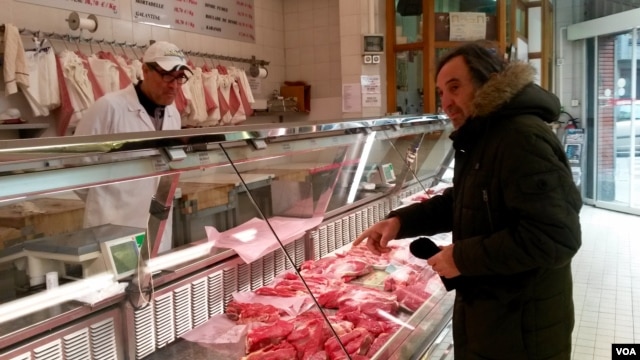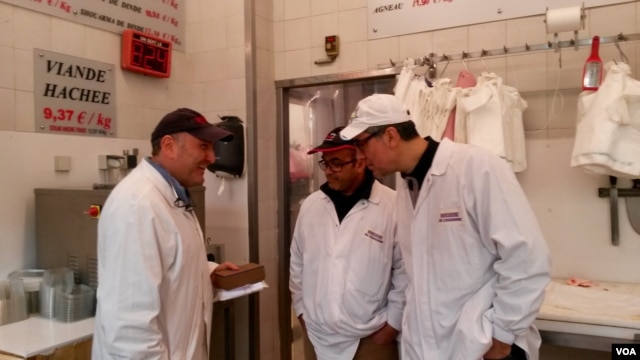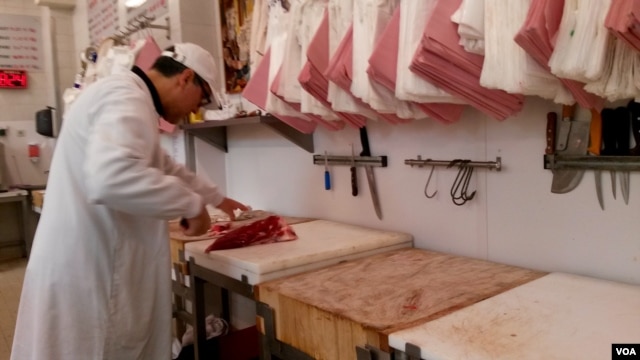Beispiel für gelebte Verständigung

Jüdisch-muslimische Metzgerei in Paris
Beispiel für gelebte Verständigung
"Nun komm schon raus, Yaya", rufen die beiden marokkanischen Metzger ihrem Kollegen zu und prusten dabei vor Lachen. Der Algerier versteckt sich vor einem Reporter - und die Kunden im Laden lächeln nur. Yaya ist ganz offensichtlich als Spaßvogel im Laden bekannt.
Es ist Freitagmorgen, und in nur einer Stunde wird die "Boucherie de l'Argonne" schließen. Dann begeben sich die hier arbeitenden Muslime zum Freitagsgebet, die Juden bereiten sich auf den Shabbat vor. Praktisch für alle, denn: Juden und Muslime arbeiten hier zusammen.
"Die Zusammenarbeit läuft prima", sagt Philippe Zribi, ein aus Tunesien stammender Jude, dessen Eltern die Gründer der Metzgerei sind. Die Zribis haben extra einen Gebetsraum für ihre muslimischen Mitarbeiter eingerichtet. Manchmal essen alle zusammen zu Mittag. Die Sprache am Esstisch geht fröhlich durcheinander - mit vielen arabischen Nuancen aus den Heimatländern der Muslime.
Das Pariser Geschäft der Zribis ist keine Selbstverständlichkeit in einer Stadt, die erst vor kurzem Opfer von tragischen, religiös-fanatisch motivierten Anschlägen wurde. Und in einer Stadt, in der sich die Berichte über antisemitische Zwischenfälle häufen. Die Metzgerei, ruhig gelegen an einer stillgelegten Bahnstrecke, zeichnet ein deutlich positiveres Bild: Das eines funktionierenden, interkulturellen Zusammenlebens. Und mehr noch. Das Geschäft steht stellvertretend für den Schmelztiegel des 19. Arrondissements. Im Nordosten der französischen Hauptstadt leben laut offiziellen Angaben rund 200.000 Menschen aus nicht weniger als 120 Ländern. Chinesische Gemüsestände gegenüber von afrikanischen Restaurants und türkische Imbissständen: Das 19. Arrondissement steht für Multi-Kulti.
Auch Juden sind stark vertreten. Zwar führt Frankreich keine amtlichen Statistiken über die ethnische oder religiöse Zugehörigkeit seiner Bewohner, aber auf rund 30.000 bis 40.000 Einwohner mosaischen Glaubens dürfte es das "Neunzehnte" schaffen. Es ist eines der größten jüdischen Viertel Europas, sagt der stellvertretende Bürgermeister Mahor Chiche. Gleichzeitig leben viele Muslime hier, die hauptsächlich aus dem Maghreb stammen. "Das ist ein echter Mix, eine echte Patchwork-Gesellschaft", sagt Chiche, der für das 19. Arrondissement zuständig ist.

Immer mehr Anschläge in Frankreich
Längst nicht alle Franzosen teilen Chiches Meinung. Viele lehnen "Multi-Kulti" ab - und ziehen ihre ganz eigenen Schlussfolgerungen, was zu tun ist. Die Kriminalstatistik des Innenministeriums führt frankreichweit allein für 2015 rund 400 anti-muslimische Gewalttaten auf - dreimal so viele wie 2014. Antisemitische Vorfälle gab es gar 800. Seitdem vergangenen Monat ein kurdischer Jugendlicher einen Kippa-tragenden Juden in Marseille angegriffen hat, verzichten viele Juden lieber auf die traditionelle Kopfbedeckung. Zurückhaltung lautet das Motto. "Ich bin und bleibe pessimistisch", sagt Sammy Ghozlan, der das Nationale Büro gegen Antisemitismus in Paris leitet. Wie viele andere auch gibt er muslimischen Jugendlichen und den Rechtsnationalen die Schuld an den Attacken.
Das 19. Arrondissement hat seine ganz eigenen Probleme. Die Kouachi-Brüder kamen von hier - jene Terroristen, die im Januar 2015 die Redaktion der Satirezeitung Charlie Hebdo stürmten, zwölf Menschen ermordeten und zwei Tage später selbst im Kugelhagel der Polizei starben. Sie hatten einem Extremistennetzwerk mit dem Namen "Buttes-Chaumont-Gang" angehört, benannt nach einem Park in dem Viertel. Gerade mal einen Kilometer entfernt liegt die Metzgerei "Argonne". "Einige junge Leute von hier sind nach Falludscha im Irak gegangen und als Selbstmordattentäter gestorben", berichtet Chiche. Diese Vorfälle lägen allerdings mehr als ein Jahrzehnt zurück. "Das war eine Minderheit. Trotzdem machten diese Fälle allen hier klar, dass etwas passieren muss."
Chiche ist überzeigt, dass die Vorfälle vor zehn Jahren dazu geführt haben, dass das Viertel früher als andere Teile Frankreichs Schritte unternommen hat, um Spannungen unter Jugendlichen abzubauen - genau solche Spannungen, unter denen andere Teile Frankreichs jetzt leiden. Selbst die Buttes-Chaumont-Gang sei hier letzten Endes komplett ausgehebelt worden, sagt Chiche. Antisemitische Vorfälle hätten im "Neunzehnten" abgenommen, auch wenn gerade in den Schulen noch viel erreicht müsse.
Juden und Muslime Hand in Hand
Rabbi Michel Serfaty sagt, Juden und Muslime würden inzwischen einander die Hände reichen. Er leitet eine jüdisch-muslimische Freundschaftsinitiative und weiß offensichtlich, wovon er spricht: "Viele sagen, sie können diese Art zu leben einfach nicht mehr ertragen, die ganzen Missverständnisse. Dieses Aufeinanderzugehen ist neu."

Die Argonne-Metzgerei ist ein weiteres Beispiel für gelebte Verständigung. Und das auf ganz praktische Art. Das dem Betrieb verliehene Koscher-Zertifikat dient auch den Muslimen, sagt Metzger Zribi: "Das wichtigste ist das ordnungsgemäße Schächten der Tiere". Dieser Brauch ist für die Einhaltung koscherer Essensregeln genauso wichtig wie für die Halal-Regeln.
In Sfax in Süd-Tunesien geboren, kam Zribi als Kleinkind in den Sechziger Jahren nach Paris. Seine Familie tat es vielen anderen nordafrikanischen Juden nach der Erlangung der Unabhängigkeit der Maghreb-Staaten gleich. Den Laden eröffnete sein Vater in den Achtziger Jahren, jetzt führt Zribi ihn mit einem seiner Brüder.
Metzger Mustafa Makhoukh ist Muslim und stammt aus Oujda in Marokko. Seit 18 Jahren schon arbeitet er für die Zribis, der Laden ist seine "Familie", wie er sagt. "Mit Juden zu arbeiten ist gar kein Problem für mich", sagt auch der muslimische Metzger Abdel Haq, ebenfalls aus Oujda. "In Marokko haben wir schließlich auch mit Juden zusammengelebt." In einem Punkt sind sie sich mit ihrem jüdischen Chef einig: Schuld an den Spannungen im heutigen Frankriech ist vor allem eine jugendliche Generation, die nicht die gleiche, strenge Erziehung genossen hat wie sie selber.
Juden kehren Frankreich den Rücken
Die Konsequenzen sind im Laden spürbar. Immer häufiger kommen jüdische Kunden vorbei, um sich zu verabschieden. Sie gehören zu den Tausenden von französischen Juden, die in den vergangenen Jahren nach Israel emigriert sind. "Sie fühlen sich hier schlicht nicht mehr sicher", sagt Zribi ohne sich dabei zu rühren.
Die Pariser Terroranschläge vom 13. November 2015 haben die Belegschaft der "Boucherie de l'Argonne" noch stärker zusammengeschweißt. Zribi hat zwei italienische Freunde verloren. Haq, der muslimische Kollege, hat zwar niemanden verloren, ist aber trotzdem noch immer von den Anschlägen geschockt. "Ich kann meinen Mitmenschen nur eins raten", sagt er. "Wenn ich merke, das der Mann neben mir im Café Jude ist - dann rede ich mit ihm. Wir müssen einfach aufeinander zugehen."
Elizabeth Bryant
© Deutsche Welle 2016



